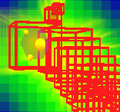Eeligon
From the Super Mario Wiki, the Mario encyclopedia
Jump to navigationJump to search
| Eeligon | |||
|---|---|---|---|
 Sprite from Super Paper Mario | |||
| First appearance | Super Paper Mario (2007) | ||
| |||
The Eeligon is an enemy in Super Paper Mario that can be found in the Outer Limits. Its name is a portmanteau of "eel" and "polygon," referring to its body, which is made up of several squares arranged like an eel. The Eeligon swims through space at a relatively fast pace, attempting to ram into the player. Any part of its body may be attacked; however, attacking the tail portions will only serve to shorten its body length. Only its head may be damaged. Eeligons are rare enemies, only appearing in a single room in the Outer Limits, and only four of them appear.
Profiles and statistics[edit]
Super Paper Mario[edit]
| Super Paper Mario enemy | |||||||||
|---|---|---|---|---|---|---|---|---|---|
| Eeligon | |||||||||

|
Max HP | 10 | Role | Common | Location(s) | Outer Limits (4-3) | |||
| Attack | 2 | Card type | Common | ||||||
| Defense | 0 | Items | Card location(s) | Card Shop; Catch Card/SP | |||||
| Score | 600 | ||||||||
| Card description | Eeligons slither through the murky bits of the cosmos. Hit them and they'll shrink faster than their egos. | ||||||||
| List of Catch Cards 134 135 136 |
Tattle | That's an Eeligon. They are space creatures that are made up of many parts... Max HP is 10 and Attack is 2. It loses pieces of itself as it takes damage... The head is the weak spot... Its movements are hard to predict, so be careful... | |||||||
Gallery[edit]
Names in other languages[edit]
| Language | Name | Meaning | Notes |
|---|---|---|---|
| Japanese | フレーゴン[?] Furēgon |
Portmanteau of "frame" and "polygon" | |
| French | Anguirouge[?] | Portmanteau of "anguille" (eel) and "rouge" (red) | |
| German | Aaligon[?] | Portmanteau of "aal" (eel) and "polygon" | |
| Italian | Anguillion[?] | From "anguilla" (eel) | |
| Korean | 프렘곤[?] Peuremgon |
Portmanteau of "frame" and "polygon" | |
| Spanish | Anguilus[?] | From "anguila" (eel) with Latin suffix "-us" |
